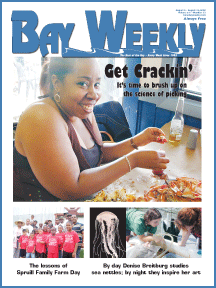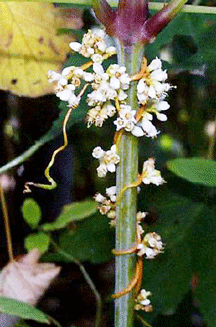
Volume XVII, Issue 32 # August 6 - August 12, 2009 |
 |
by Dr. Frank Gouin
Don’t Let This Vine Get a Foothold
Dodder thrives in Chesapeake Country
At a recent farmers market in Deale, a woman presented me with a handful of thin, yellow-to-orange vine stems with tiny seed capsules attached. They were 12 to 30 feet long. Large masses of it grow along the water’s edge in the shrubs near her lawn. Since this was her first summer at the home, she had no idea where it came from or what it was.
July and August are the best time of year to find dodder growing along the shores of the Bay and its tributaries. In the upper reaches of Rockhold Creek, north of Upakrik Farm, large patches of it grow along the shore. Over several years, they appear to be expanding.
Dodder is a parasitic vine that grows from seeds. But it derives all of its water and nutrients from plants to which it attaches.
The seeds germinate in late June. If a seedling cannot then attach itself to a plant within two to three weeks, it dies. At this stage dodder is very susceptible to the preemergent herbicide Preen.
At eight- to 12-inch intervals, the vine produces seed granular capsules. In late August and early September, the vines turn gray and fall apart, scattering their seeds.
To my knowledge there is no way of controlling this parasitic plant other than hand harvesting and burning the vines and seeds. If dodder becomes established in your garden, I recommend light, frequent hoeing to keep it under control and to eradicate it over time. Its survival depends on attaching itself to other plants, suggesting a shallow root system that can be easily destroyed.
How to Ripen Peaches
Q I’ve had trouble with peaches this year. All the ones I’ve bought have rotted before ripening. What’s wrong?
–Margaret Tearman
A Look at your peaches before you buy. Make sure their background color is yellow. Peaches will ripen only if their background color is starting to turn yellow. If it’s green, they will never ripen, but they will rot.
Fully ripe peaches can’t be marketed because they’ll bruise when you touch them. So we pick and sell peaches while they’re still hard. After you’ve bought peaches beginning to yellow, take them home and put them in a brown paper bag to ripen at room temperature. Once they’re ripe, store them in the refrigerator. They’ll keep well that way.
At temperatures over 70 and with high humidity, brown rot starts and quickly goes through peaches.
Caution: Unripe peaches turn grainy in the refrigerator.